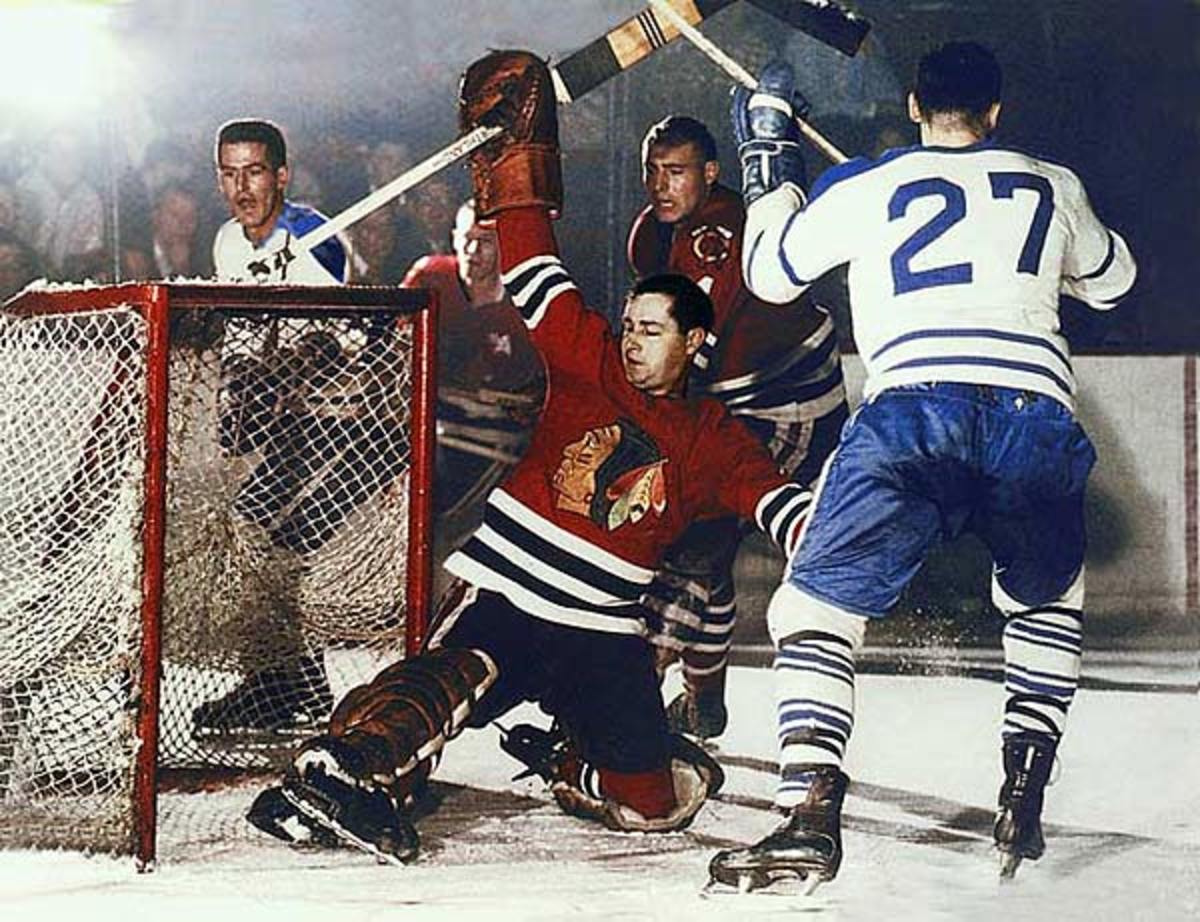
The most mind-boggling streak in sports
Ironman goaltender Glenn Hall weathered crease crashers and slap shots without a mask during a remarkable streak that lasted more than seven years. (IHA/Icon SMI)
By Stu Hackel
It's been interesting to read all the accolades that are being tossed around for Brett Favre, the NFL QB whose streak of 297 consecutive regular season starts -– 321 if you count the playoffs -- ended Monday because of a shoulder injury. His streak has been called not just one of the greatest achievements in pro sports (as SI.com's Don Banks referred to it), but even the greatest streak in pro sports by some, including FOX broadcaster and Hall of Fame quarterback Troy Aikman, who saluted Favre during the broadcast of the Vikings-Giants game. Others, like The L.A. Times, had sportwriters from around the country weigh in on whether Favre's streak was more impressive than Cal Ripken's 2,632 consecutive games played for the Orioles.
Some comparisons with Favre also mentioned Doug Jarvis's NHL record of 964 games played, from Oct. 8, 1975 to Oct. 10, 1987, that broke Garry Unger's previous mark of 914. Jarvis was no perimeter player, but a fine defensive center who was in the middle of and initiating physical play each night. Those who think that Favre's achievement is unmatched because football is so violent don't watch much NHL hockey, and somehow forget that the NFL rules protecting quarterbacks made their plight a bit less risky during Farve's tenure.
ESPN.com offered its list of all-time greatest streaks and had Joe DiMaggio's 56-game hitting streak in 1941 as their top mark and -- holy jumpin'! -- Red Wings and Blackhawks goalie Glenn Hall's 502 consecutive games played from 1955 to 1962 as number 2.
Well, kudos to them for even mentioning Hall, much less ranking his achievement so high. It's truly hard, if not impossible, to compare these achievements. But just for fun, let's put Hall's streak in its proper context: First, as Tom Adrahtas points out in his excellent 2003 biography of Hall, when you add his minor league, All-Star and playoff games beginning in 1951, he played a staggering, mind-boggling total of 881 straight until 1962.
And if we ignore (as if we could) what Hall did apart from the regular season, his streak is not something, like DiMaggio's, that took place over part of a season, or accumulated once a week like Favre's, and played out in a pastoral setting like Ripken's, but over seven full NHL and 11 pro hockey seasons. Not to take anything away from any of the others, which are all magnificent feats, but what Hall did is impossible to fathom by comparison and, because of changes in the game, will never happen again.
And Hall played all those games, all those years, without a mask, and suffered a few pretty serious injuries along the way, including getting hit in the mouth by a puck during the 1957 playoffs, losing some teeth and still continuing to man the Red Wings' net.
By the time Hall's streak ended, the slap shot was in vogue and the risks -- physical, emotional and psychological -- to a bare-faced goalie were high. Hall had to face not only Boom Boom Geoffrion's and Andy Bathgate's wicked slap shots in games, but teammate Bobby Hull's much more often in practice. It added to the risk of injury that already existed from hard-charging players who ran goalies when they couldn't get pucks by them. No one crashed into DiMaggio when he was trying to hit a baseball. Hall endured plenty of hits.
It's no wonder that Hall was often sick to his stomach before games, vomiting in his team's dressing room before the opening faceoff. In fact, the Hawks used to joke that if Hall was puking, they knew he'd have a good game and they'd have a chance to win.
Well, these arguments are really unwinable, no matter which feat one favors. But we wanted to make our preferences clear here at Red Light.
































